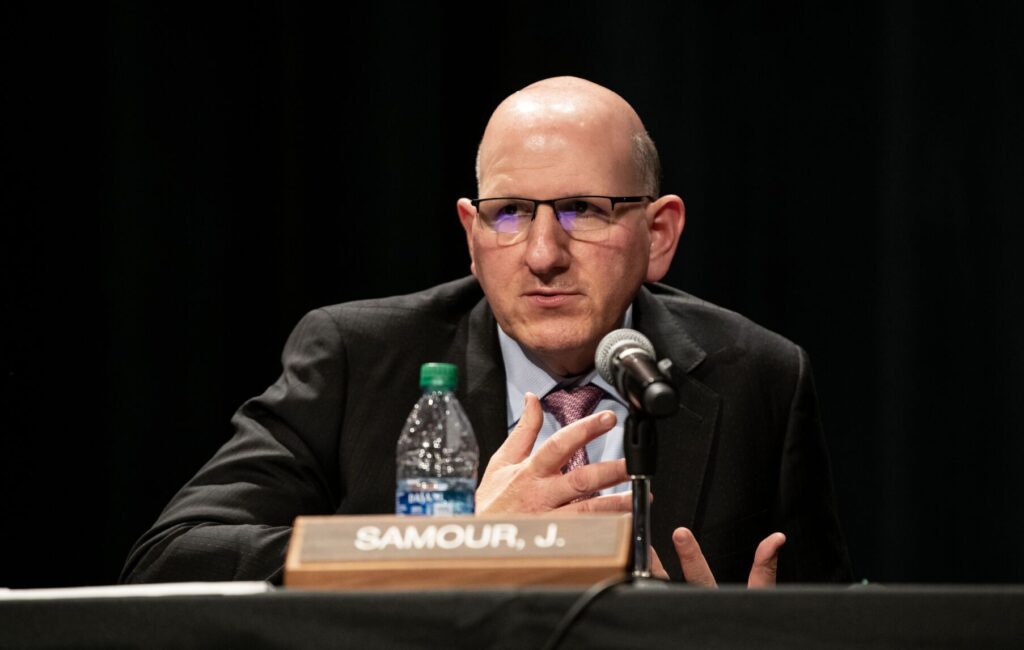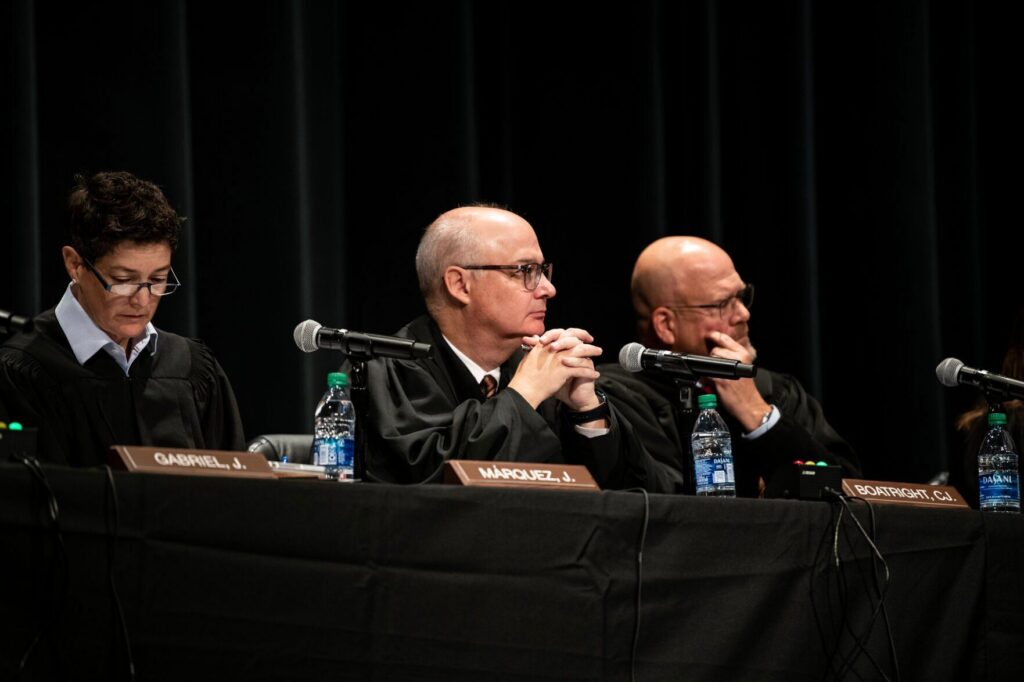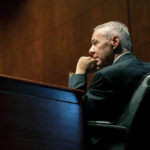14th Amendment expert, Trump defenders testify in Colorado ballot disqualification hearing
The Denver judge who will decide if Donald Trump is constitutionally ineligible to appear on Colorado’s presidential primary ballot heard from a 14th Amendment expert on Wednesday, who testified its prohibition on holding office applies to the presidency and that evidence of violence was historically not necessary to show someone violated the insurrection clause.
An official from the Colorado Secretary of State’s Office also spoke about the routine practice of excluding candidates from the ballot who do not meet the legal qualifications.
Lawyers for Trump, meanwhile, presented two witnesses whose testimony addressed the steps the administration reportedly took to minimize violence and deter pro-Trump “crazies” from causing problems on Jan. 6, 2021.
Four Republican and two unaffiliated voters have petitioned to force Democratic Secretary of State Jena Griswold to exclude Trump from next year’s primary ballot under the theory that he is ineligible to hold office. Section 3 of the 14th Amendment bars members of Congress or “an officer of the United States” from occupying state or federal office if they have taken an oath to the U.S. Constitution, but subsequently “engaged in insurrection.”
Gerard Magliocca, a law professor at Indiana University, took the witness stand to describe to Denver District Court Judge Sarah B. Wallace how Section 3 functioned historically to disqualify candidates.
“The main thing that prompted Section 3 was that they wanted to keep officials who had left to join the Confederacy from returning to office unless they show that they deserved a second chance,” he said. When the Civil War ended, “many of the same people who had been in office before the war and left to join the Confederacy were returned to office. Some of them showed up to their new office and said ‘we’re here to take our seats now’ as if nothing had happened.”
Magliocca elaborated that congressional Republicans did not want to bar all members of the Confederacy from office, but sought to focus on those who were most culpable: People who swore an oath to the Constitution and then rebelled against it.
Section 3 “was not intended as punishment. A number of senators discussed the fact that this was simply adding another qualification to office,” he said.
Addressing the current controversy around Section 3’s application, Magliocca said the “general language” was a clue Congress did not intend the prohibition to apply solely to the Confederacy. Also, the phrase “officer of the United States,” according to the historical record, was understood to include presidents.
He argued “insurrection” did not always require violence, and could include actions or speech designed to resist the execution of the law. Magliocca pointed to a congressman-elect from Kentucky who was barred from taking office after the Civil War because he wrote a letter to the editor advocating violence against pro-Union groups. Another federal politician, a senator-elect from Maryland, gave $100 to his son before the son departed to join the Confederate army. He, too, was not seated.
The petitioners also presented their final witness, Hilary Rudy, deputy elections director in the secretary of state’s office. Rudy, who has worked in the office since 2006, testified to instances in which candidates were not certified for the ballot because of residency issues, non-citizenship or factors related to their candidacy filings.
“It’s the secretary’s position that if we have affirmative knowledge a candidate is ineligible for office, then we will not certify them to the ballot,” she said.
Rudy referenced the case of Abdul Karim Hassan, a naturalized citizen who wished to run for president in 2012, even though the Constitution only permits “natural born” citizens to hold the office. Then-Secretary of State Scott Gessler, who represents Trump in the current proceedings, argued Hassan was ineligible. Then-Judge Neil M. Gorsuch, who Trump later elevated to the U.S. Supreme Court, wrote the judicial decision upholding Hassan’s exclusion.
In the afternoon, Wallace rejected Trump’s motion to resolve the case in his favor before hearing from two of Trump’s witnesses.
Kashyap “Kash” Patel, who held national security-related roles in the Trump administration and was chief of staff to the acting secretary of defense on Jan. 6, spoke about Trump’s authorization of 10,000-20,000 National Guard troops to be present in the District of Columbia. Patel laid blame on Mayor Muriel Bowser for not requesting an increased troop presence before Jan. 6.
His testimony appeared to be aimed toward rebutting the argument that Trump, who controlled the D.C. National Guard, did nothing to protect the Capitol, members of Congress and the integrity of the electoral vote count.
On cross-examination, the petitioners’ attorney pointed out the congressional committee that investigated the Jan. 6 attack concluded there was no evidence Trump ordered the deployment of thousands of National Guard troops to save the Capitol. Acting Defense Secretary Christopher Miller – Patel’s boss – told the committee there was no such order.
In a heated exchange, attorney Sean Grimsley also interrogated Patel about his children’s books lionizing Trump as a king, and his book about the “deep state.”
“Is this proceeding part of the deep state?” Grimsley pressed. “Am I part of the deep state? Is the judge part of the deep state?”
“I think the judge is beyond reproach,” Patel retorted.
The final witness of the day was Katrina Pierson, a Tea Party activist from Texas who became a spokesperson for Trump during his first run for the presidency. She said she became concerned that the Jan. 6 rally at the White House Ellipse, where Trump would speak before urging his supporters to go to the Capitol, was being stocked with “bad actors.”
“These guys don’t care. They want attention. They want the notoriety. They just want the chaos,” she said, name checking radio host and purveyor of conspiracies Alex Jones, among others. “And I was concerned with emotions being high and the number of people who were likely gonna be there that we need to be on alert.”
Pierson said she met with Trump before Jan. 6, and he agreed to strike the “crazies” from speaking. On cross-examination, Pierson was confronted with her text messages during and after Jan. 6, in which she referenced a “civil war” and said it was “pretty damn funny” to see a Trump supporter carry away the speaker of the House’s lectern.
“Yes, it was hysterical,” Pierson testified.
The hearing will continue on Thursday. Trump’s lawyers indicated they plan to call U.S. Rep. Ken Buck as a witness.
The case is Anderson v. Griswold et al.












